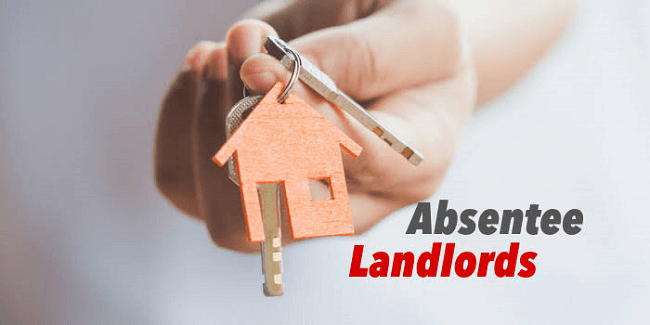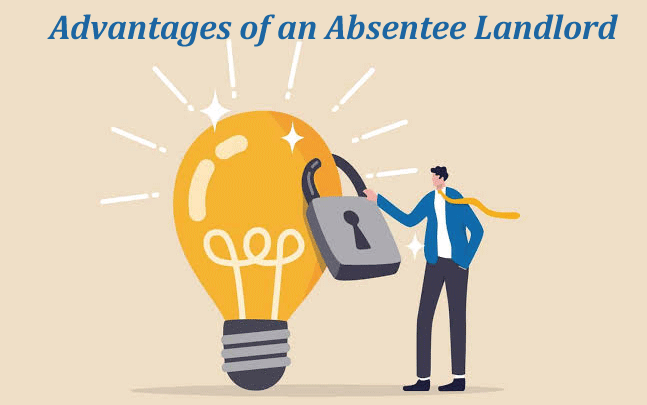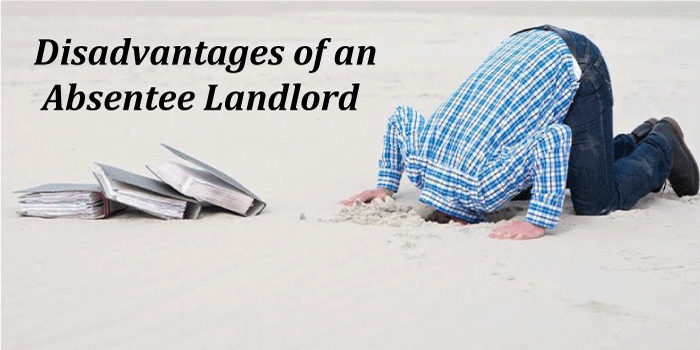Absentee LandlordWhat is an Absentee Landlord?An absentee landlord is known as a person, business, or government organization that owns and leases out real estate but is not based at or close to the property. An owner-occupied landlord, or one who resides in the rental property, contrasts with an absentee landlord. A typical example of an absentee landlord is someone who rents out a second house, a holiday home, or a business property that is not his/her permanent residence. 
An "absentee landlord" is a landowner that invests in residences solely for financial benefit and has no links to the community, which can have a bad connotation. This may include people who own commercial property, second houses for rental purposes, holiday residences, and/or those who may have had to relocate away from their principal abode. Tax savings for absentee landlords include the cost of commuting to their rental property. Being an absentee landlord has various drawbacks, including carelessness and other hazards related to irregular property supervision. Understanding Absentee LandlordFrom the residential property market perspective, the phrase "absentee landlord" sometimes carries a negative interpretation since such a landlord may not be conducting the necessary maintenance and repairs on the property. Additionally, they have just financial interests in the community. Particularly given that they are taking money out of the house but frequently aren't putting it back into the neighborhood for its growth. The goal of absentee landlords who own real estate is frequently to make money through rentals. This application runs counter to the short-term thinking of real estate shareholders who purchase and then swiftly sell or "flip" properties to make a profit. In contrast to the housing real estate market, commercial properties have a higher prevalence of absentee landlords. An absentee landlord, however, might appear in various circumstances without carrying a bad reputation. For instance, a person can have bought a house but later moved to a different location for employment. He would then rent it out as opposed to selling it. Absentee landlords frequently hire a property agent to maintain the property and care for any problems that may arise. Advantages of an Absentee Landlord
Many real estate agents must decide between selling their home if they must relocate or keeping it and renting it out instead, thus becoming absentee landlords. The owner can continue to live in the house while letting its value increase by keeping it as an income-generating asset. When not used by the owner, homes may turn into holiday rentals. The homeowner may intend to reclaim it and continue living there anytime. This kind of income property entitles the owner to several tax advantages. For instance, some travel expenses made for upkeep or inspection of the asset are tax deductible. Rental income is subject to reporting requirements and ordinary owner tax rates. The owner must also take into account certain conditions for the storage of security deposits. One's real estate portfolio can be more diversified if one has properties in multiple markets. Disadvantages of an Absentee Landlord
It might be dangerous for the property owner to be an absentee landlord. A continuing concern is a damage or a total loss brought on by carelessness or bad behavior by tenants. Without proper oversight, squatting situations and difficult evictions of tenants are also possible. Building and zoning rules are frequently disregarded or only minimally observed in housing properties held by absentee landlords, leaving them in a poor state of repair. The tenants should regularly address the yard and landscaping, which devalues the adjoining property. Absentee landlords frequently employ a management business to handle the maintenance responsibilities and collect money from tenants at a cost that reduces their profitability. Asset owners are also bound to municipal laws that they need to be aware of and that, if ignored, might result in serious legal issues. Landlord Maintenance ResponsibilitiesThe same obligations apply to absentee landlords as to all other landlords. They must abide by the state's landlord-tenant rules regarding the rental asset they own. Examples of some notable landlord obligations include the following:
Tenants' RightsThe following are just a few of the many rights that tenants may get under landlord-tenant law:
Tenant's Remedies for Absentee LandlordsTenant shall first give written notice to the landlord of any violation of any provisions of the Lease. The tenant has the right to complain about the landlord if he doesn't address the problem within a reasonable amount of time, which will vary depending on specific state laws. If a complaint is made, an inspector may visit the premises and penalize the owner with a safety or health-related violation. The tenant's landlord may be required to pay the penalty and will be given a set amount of time to make the necessary repairs. The landlord may need to appear before a judge to pay the fee, contest the infraction, or be ordered to do so for failing to make the necessary repairs.
Next TopicAbsenteeism
|
 For Videos Join Our Youtube Channel: Join Now
For Videos Join Our Youtube Channel: Join Now
Feedback
- Send your Feedback to [email protected]
Help Others, Please Share










